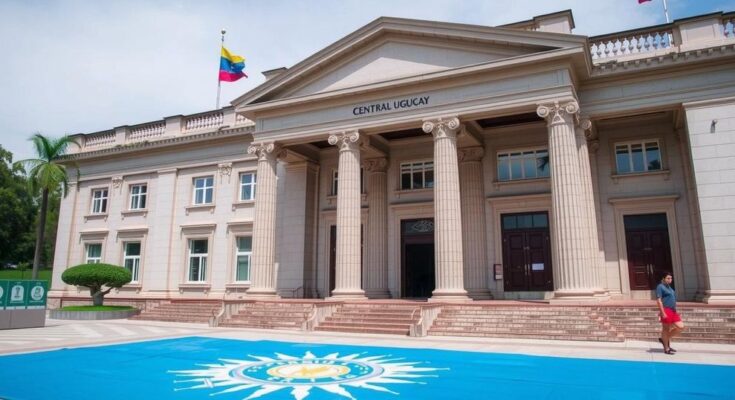Uruguay’s Central Bank has raised the benchmark interest rate from 8.5% to 8.75% to align inflation expectations at 4.5% annually. Core inflation has risen, while GDP grew by 4.1% in Q3. Analysts project economic growth of 3.1% in 2024 and inflation at 5.37%. The bank’s positive assessment underscores confidence despite external risks.
On Monday, Uruguay’s Central Bank (BCU) Monetary Policy Committee enacted an increase in the benchmark interest rate from 8.5% to 8.75%. This adjustment aims to align inflation and expectations at a target annual rate of 4.5% over the past two years, marking the first alteration in the rate since it was lowered in April from 9%. Yearly inflation registered at 5.03% in November, reflecting a year-and-a-half of values within the targeted range, the longest since the inflation targeting system commenced.
Notably, core inflation has risen for the second successive month and is currently outpacing headline inflation, primarily due to growth in tradable inflation. In November, two-year inflation expectations decreased to 5.83%, only to slightly increase to 5.89% in December, reflecting the fluctuating landscape. The Committee noted worsening international activity prospects due to slower growth in advanced economies and ongoing inflationary pressures in core components.
Parallel to these developments, the U.S. Federal Reserve has reduced interest rates for the third consecutive meeting, indicating a cautious market outlook moving forward. Meanwhile, Uruguay’s Gross Domestic Product (GDP) demonstrated a year-on-year growth of 4.1% in the third quarter, with expectations set for an average annual growth of around 3.4% in 2024. Furthermore, the BCU’s Expectations Survey anticipates a 3.1% growth in 2024, a slight uptick from November’s forecast of 3%.
Overall, analysts predict an economic expansion of 2.5% for 2025, while inflation for 2024 is projected at 5.37%. Despite recent economic fluctuations, the BCU has maintained a positive view of the monetary policy transmission mechanisms in effect.
This comprehensive assessment underscores the Central Bank’s commitment to establishing a stable economic environment while adapting to both domestic and international trends that could influence its financial policies.
Uruguay’s Central Bank (BCU) is responsible for formulating and executing monetary policies aimed at controlling inflation and promoting economic stability. The institution employs benchmark interest rates as a tool to manage inflationary expectations and stimulate economic growth. In recent months, fluctuations in global economic conditions, particularly within advanced economies, have influenced the BCU’s decisions regarding interest rate adjustments. Understanding these dynamics is crucial for grasping the rationale behind the recent update in interest rates and the anticipated economic outlook for Uruguay.
In conclusion, the BCU’s decision to raise the benchmark interest rate to 8.75% reflects a strategic response to evolving inflationary trends and economic forecasts. Despite the rise in core inflation, year-on-year rates have remained stable within the targeted range, signaling sustained confidence in monetary policy mechanisms. Uruguay’s GDP growth and future expectations suggest potential for economic stability, albeit with necessary vigilance in response to both domestic and international economic landscapes. The projections for inflation and economic expansion highlight the challenges and opportunities that lie ahead for Uruguay’s financial policymakers.
Original Source: en.mercopress.com




